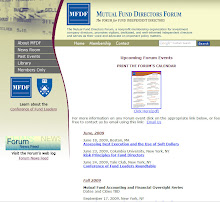In May, Senator Michael Crapo (R-ID) introduced a bill to amend the Internal Revenue Code to allow individuals to defer recognition of capital gains distributions from mutual funds, so long as they reinvest the distributions in the fund. If passed, the bill would defer the recognition of any capital gains until the mutual fund shareholder takes an actual distribution of gains from the fund, or redeems his or her shares. A similar bill was introduced in July in the House of Representatives by Rep. Paul Ryan (R-WI), Rep. Arthur Davis (D-AL), and Rep. Joe Crowley (D-NY).
Under the current law, in order retain their status as a Regulated Investment Company under IRS Subchapter M, mutual funds must pass through essentially all of their profits to shareholders, and shareholders incur capital gains taxes just for holding their shares, even if the capital gains are reinvested in the fund, rather than taken out as cash. Though mutual fund investors also incur capital gains when they sell shares at a NAV for a gain, the bills do not address this kind of capital gain. The treatment of taxing reinvested capital gains in mutual funds has long been considered by many to be unfair to shareholders because: (1) funds do not pass through losses to shareholders, only gains, so shareholders cannot use them to offset gains (or carry them forward to years when they do have gains); and (2) this treatment complicates shareholder decisions about when to purchase and sell shares.
The House and Senate bills, both entitled, the "Generate Retirement Ownership Through Long-Term Holding Act of 2009," seek to remedy what has been seen as an impediment to holding mutual fund shares for a long term. Though both the House and Senate bills' titles contain the word "retirement," neither bill is aimed at taxation of mutual fund shares held through IRA, 401(k), or other qualified retirement vehicles. Funds held through these kinds of retirement accounts already receive preferred tax treatment. Rather, these bills are aimed at capital gains on mutual fund shares held directly. As we reported in our December 23, 2008 post, "Scholar Examines the Effect of the Tax Code on US Mutual Funds," some experts in mutual fund taxation see the change to capital gains treatment proposed by the Generate Retirement Ownership Through Long-Term Holding Act of 2009 as potentially having a significant effect on the competitive position of U.S. mutual funds in the global market.
The full text of H.R. 3429 is available at: http://thomas.loc.gov/cgi-bin/query/z?c111:H.R.3429:
The full text of S. 1082 is available at: http://www.opencongress.org/bill/111-s1082/text
Related Article:
Under the current law, in order retain their status as a Regulated Investment Company under IRS Subchapter M, mutual funds must pass through essentially all of their profits to shareholders, and shareholders incur capital gains taxes just for holding their shares, even if the capital gains are reinvested in the fund, rather than taken out as cash. Though mutual fund investors also incur capital gains when they sell shares at a NAV for a gain, the bills do not address this kind of capital gain. The treatment of taxing reinvested capital gains in mutual funds has long been considered by many to be unfair to shareholders because: (1) funds do not pass through losses to shareholders, only gains, so shareholders cannot use them to offset gains (or carry them forward to years when they do have gains); and (2) this treatment complicates shareholder decisions about when to purchase and sell shares.
The House and Senate bills, both entitled, the "Generate Retirement Ownership Through Long-Term Holding Act of 2009," seek to remedy what has been seen as an impediment to holding mutual fund shares for a long term. Though both the House and Senate bills' titles contain the word "retirement," neither bill is aimed at taxation of mutual fund shares held through IRA, 401(k), or other qualified retirement vehicles. Funds held through these kinds of retirement accounts already receive preferred tax treatment. Rather, these bills are aimed at capital gains on mutual fund shares held directly. As we reported in our December 23, 2008 post, "Scholar Examines the Effect of the Tax Code on US Mutual Funds," some experts in mutual fund taxation see the change to capital gains treatment proposed by the Generate Retirement Ownership Through Long-Term Holding Act of 2009 as potentially having a significant effect on the competitive position of U.S. mutual funds in the global market.
The full text of H.R. 3429 is available at: http://thomas.loc.gov/cgi-bin/query/z?c111:H.R.3429:
The full text of S. 1082 is available at: http://www.opencongress.org/bill/111-s1082/text
Related Article:
- "Scholar Examines the Effect of the Tax Code on US Mutual Funds," December 23, 2008





